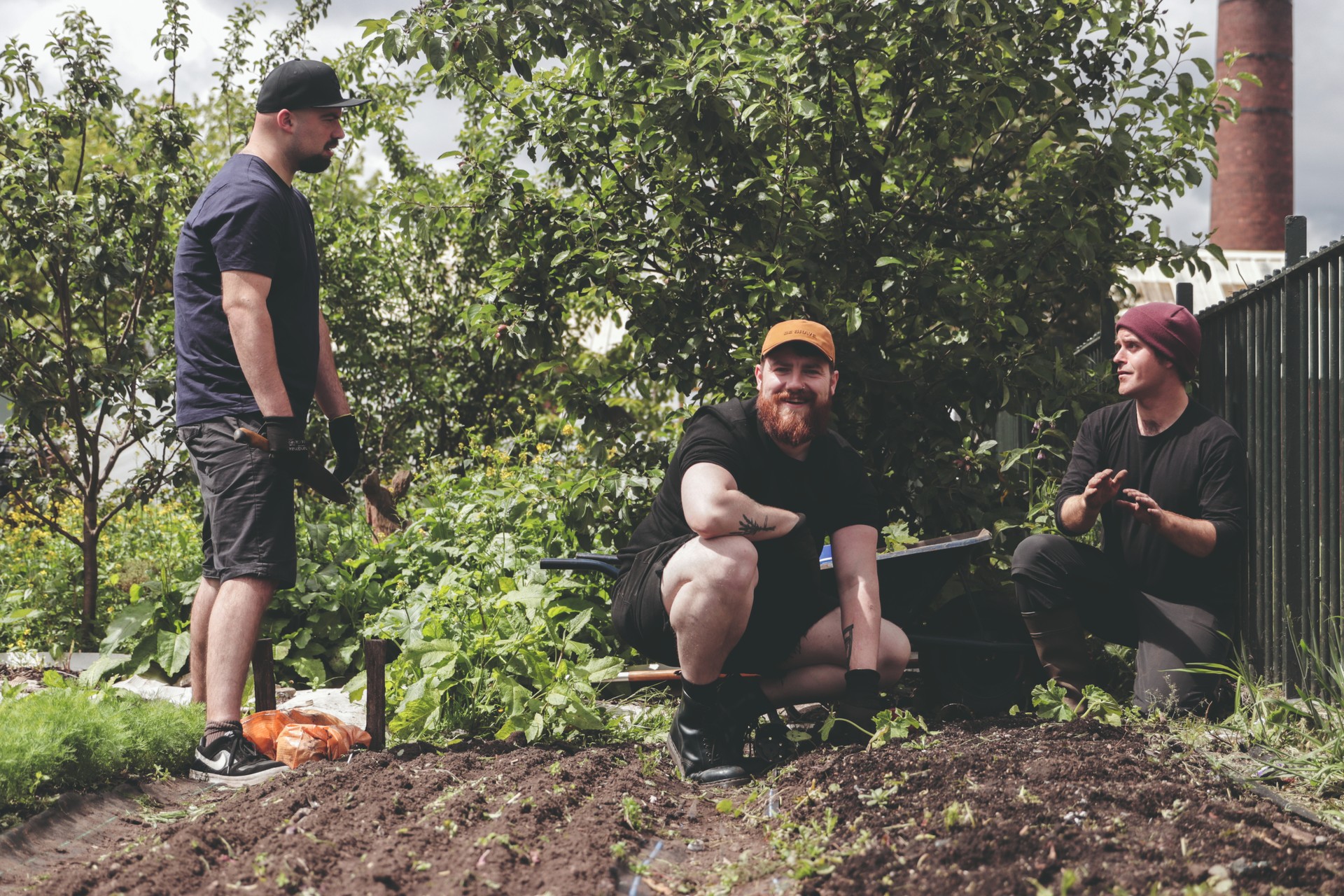Feeding the Locals
Practical insights from the UK’s food & drink scene
Not many industries allow for businesses to embed themselves in the community quite like food and drink. We've chosen six business owners from across the UK to share their tips on different aspects of building a well-loved local business: from choosing the right location to set up shop, to building customer loyalty and collaborating with the right people.
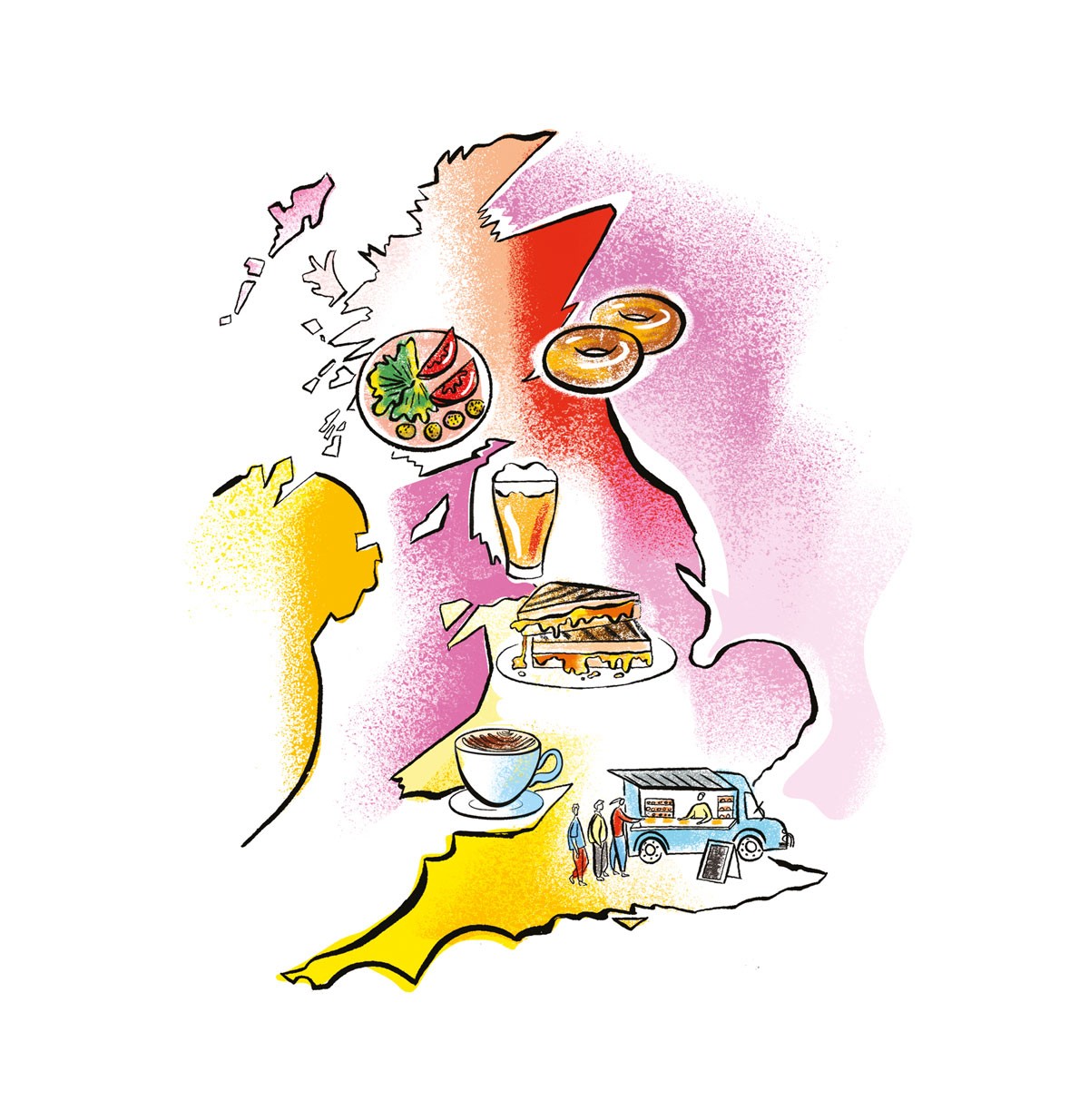
Edinburgh
From personal hobby to community lynchpin
— The Bearded Baker
Having started testing bagel recipes in their kitchen, Rowan Walker and Julia Wayper's cafe has become a homely local favourite.
Edinburgh native Rowan Walker was working as a political researcher when the seed was planted. On menus across the city’s cafes, bagels were all over the place – but they were mostly shop-bought and low-quality, with very few fresh or homemade. Inspired by his mother’s cooking – and with fond memories of time spent working at IJ Mellis Cheesemongers while studying – the pull of putting his hands to work was too much.
‘Working with food just felt so natural,’ Rowan says. ‘When I finished my degree and got a “real job”, I really missed it and ended up spending most of my free time baking. I even started a blog to justify it! I started experimenting and teaching myself to bake as much as I could.’
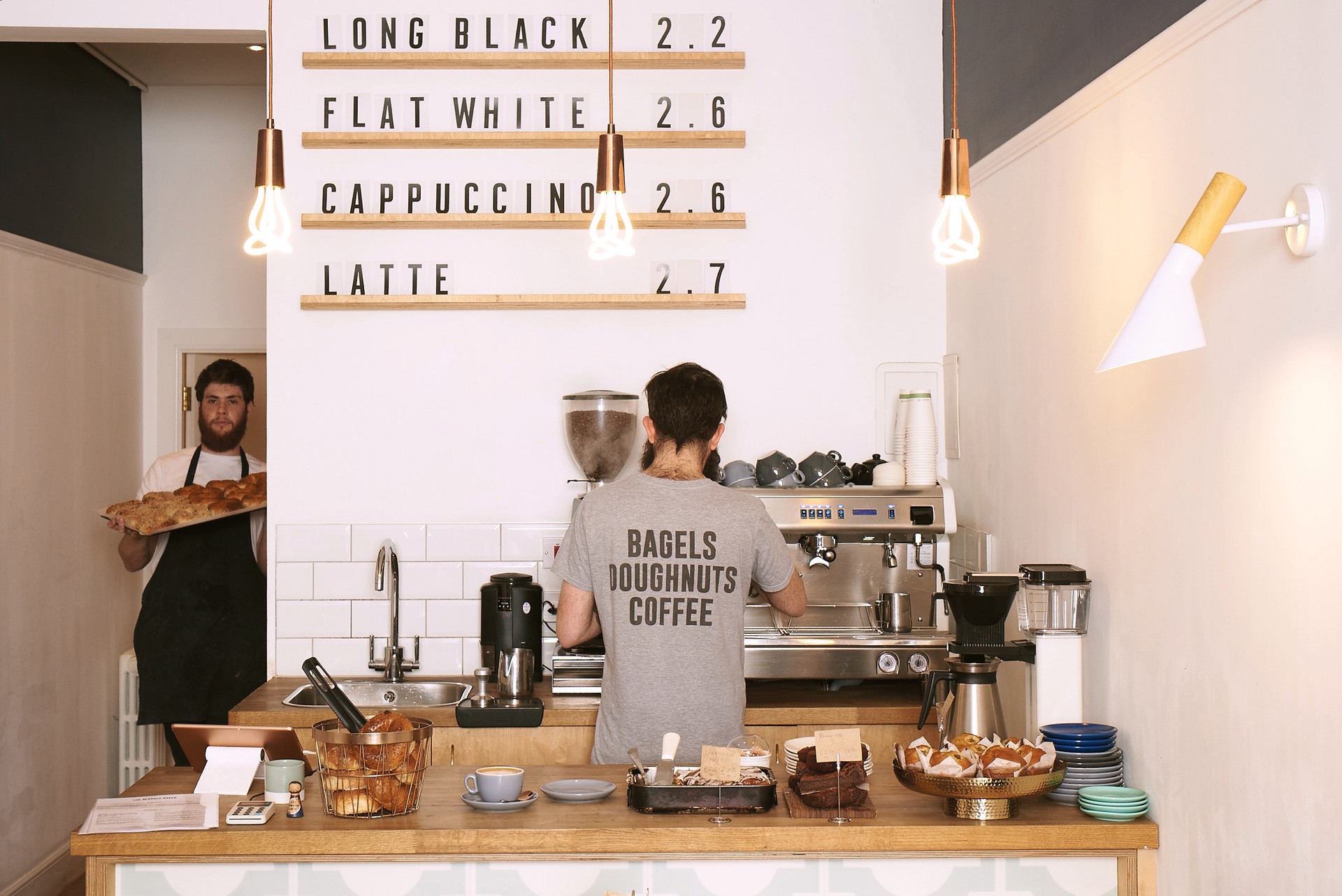
In 2014, Rowan began testing out bagel recipes, arriving at the one still used in his bakery and cafe today. ‘I made them for a few neighbours and friends, and they agreed they were better than anything out of the supermarkets,’ he recalls. ‘I messaged my old boss at the cheesemonger and asked if they'd like to see how they sold – he was keen to give it a go. I started dropping off eight bagels a day and they sold surprisingly well. I thought this would be just a little hobby, but when I chatted to a local cafe they put in an order for 20 a day almost immediately. When a new cafe, Filament, starting exclusively using our bagels on their menu, I quickly left my old job behind.’
Today, The Bearded Baker operates from an intimate spot on Rodney Street, turning from a small wholesaler solely producing bagels to a hustling bakery-cafe doing bagels, doughnuts, cinnamon buns and sourdough alongside locally roasted coffee.
Its growth is down as much to its welcoming and homely vibe as to those bagels. Features such as a special breastfeeding area have helped build a local affinity; when its windows were broken, it was a crowdfunding campaign that paid for their replacement. ‘If you have a good model and product, your business will grow naturally,’ advises Rowan. ‘Just work hard, promote as much as you can on social media and don't look too much at other businesses and think: we should be more like them.’
WHY ZETTLE?
A more flexible solution
Zettle’s platform is designed to give you room to grow. There are no lock-in contracts to hold you back and its committed and consistent service takes the stress out of managing your operation.
Manchester
Mastering the art of collaboration
— Seven Brothers
In a crowded market, Seven Brothers has looked to unlikely places to stay ahead of the pack and become the pride of Manchester
The McAvoys know a thing or two about collabs. As co-founders of Seven Brothers Brewery, one of Manchester's best-loved breweries, the seven siblings have each other to answer to and strategise with, as they try to expand their craft-beer business. They opened their Salford-based brewery in 2014, riding the crest of the craft beer wave that peaked in 2018. With signs of saturation and consolidation, offering something original is essential.
‘Staying ahead of the competition can be difficult,’ acknowledges Keith McAvoy, head of commercial and business strategy. ‘But if you stick to your ethos and core beliefs, then you will make an impact.’ Beyond the eye-catching list of session brews, stouts and IPAs, the brewery is doing things cooperatively that has helped it thrive. ‘We have such a wide range of ages in our family that fresh ideas aren’t hard to come by,’ says Keith. ‘Being family helps but we wouldn’t be where we are now without the non-family members of the team.’
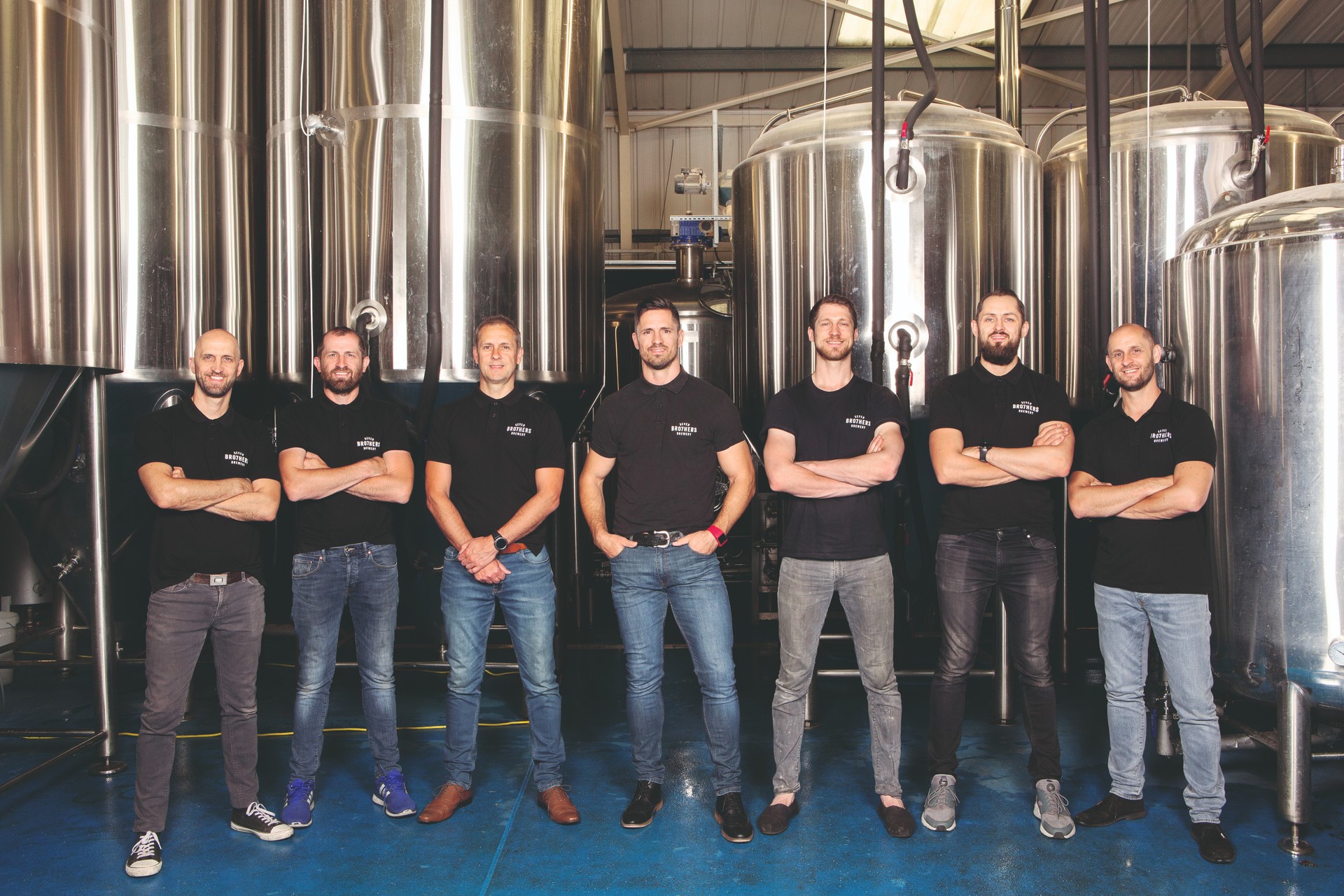
There are also some unlikely external partnerships that have helped grow the brand into a real source of pride in Manchester. That includes a beer produced for indie band Wolf Alice, and Throw Away IPA, made with cornflakes rejected by Kellogg’s as being the wrong size for its cereal packets. That Kellogg's sought out Seven Brothers says plenty about its burgeoning rep for doing things differently, ‘Kellogg’s was about synergy and common values,’ says McAvoy. ‘They saw what we were doing with beer and approached us to see if was possible to work together. Food waste is an important issue to many across the world, so to be part of this initiative with Kellogg’s was amazing.’
They saw what we were doing with beer and approached us to see if was possible to work together...
The success of a recent crowdfunding drive is leading to openings in Manchester and Liverpool, with more to come in Leeds, Nottingham and Birmingham. The brewery is also set for a presence at Manchester Airport’s new Amber Alehouse, reflecting its positioning as one of Manchester's beer representatives to the international beer scene. ‘Being diverse and open to everything and everyone is something we encourage,’ says Keith. ‘The only way for our business to thrive is to be part of the community, to be open and inclusive.’
@sevenbro7hers

How to build unrivalled customer loyalty
— Northern Soul Grilled Cheese
Grilled cheese specialist Northern Soul has long been drawing the crowds with its unreal cheese toasties. Here founder Dan Place shares what it is that's made it one of Manchester’s best-loved small businesses.
01
Focusing on the small things.
‘Back in the day, it was the little things that got around to people – like handwritten messages on the box saying, “Have a great day, love the Northern Soul team.” We give staff the flexibility to put jokes on the box that tap into Manchester's dry wit, or to throw in some Oreos – little touches that don’t cost the earth. Doing something for the customer at the point of sale really makes a difference.’
02
Authenticity on socials.
‘We’ve got a small, potent following – we’re a small business and I’d rather that than a huge following that doesn’t bear any fruit. I’d say that 85% to 90% of our followers are people who spend money in the shop, so we want social to speak to our core customers on our channels. We’ve never gotten bogged down in vain following figures. Our numbers are growing organically by a couple hundred a month and we try to keep the pictures of our sandwiches true to how they come.’
03
The loyalty card.
‘I know plenty of big chains that would love to have the loyalty card we have. It’s fierce. Eight grills and then any sandwich on the board is free. Often there’s nobody in the queue who doesn’t have one. It’s still a strong sales approach, but we try to avoid giving customers the opportunity to say “no“ – rather than asking if they want one, we offer them the chance to get started with one. Five or six fully stamped cards come through the shop a day – sometimes I worry someone’s got hold of our stamper. You’re not going to have grilled cheese every day, and I love the fact that people come with these battered cards that have been in their pocket for six months.’
04
Embracing the mistakes.
‘We’re not perfect. When we make mistakes, we embrace and own them. We make a rule of not going back to people who are negative and getting stuck in online slanging wars. We stay out of all that. We’ll privately email people if there’s been a problem. Otherwise customers can look at all our reviews, the odd dodgy one included, and make up their own mind.’
Bristol
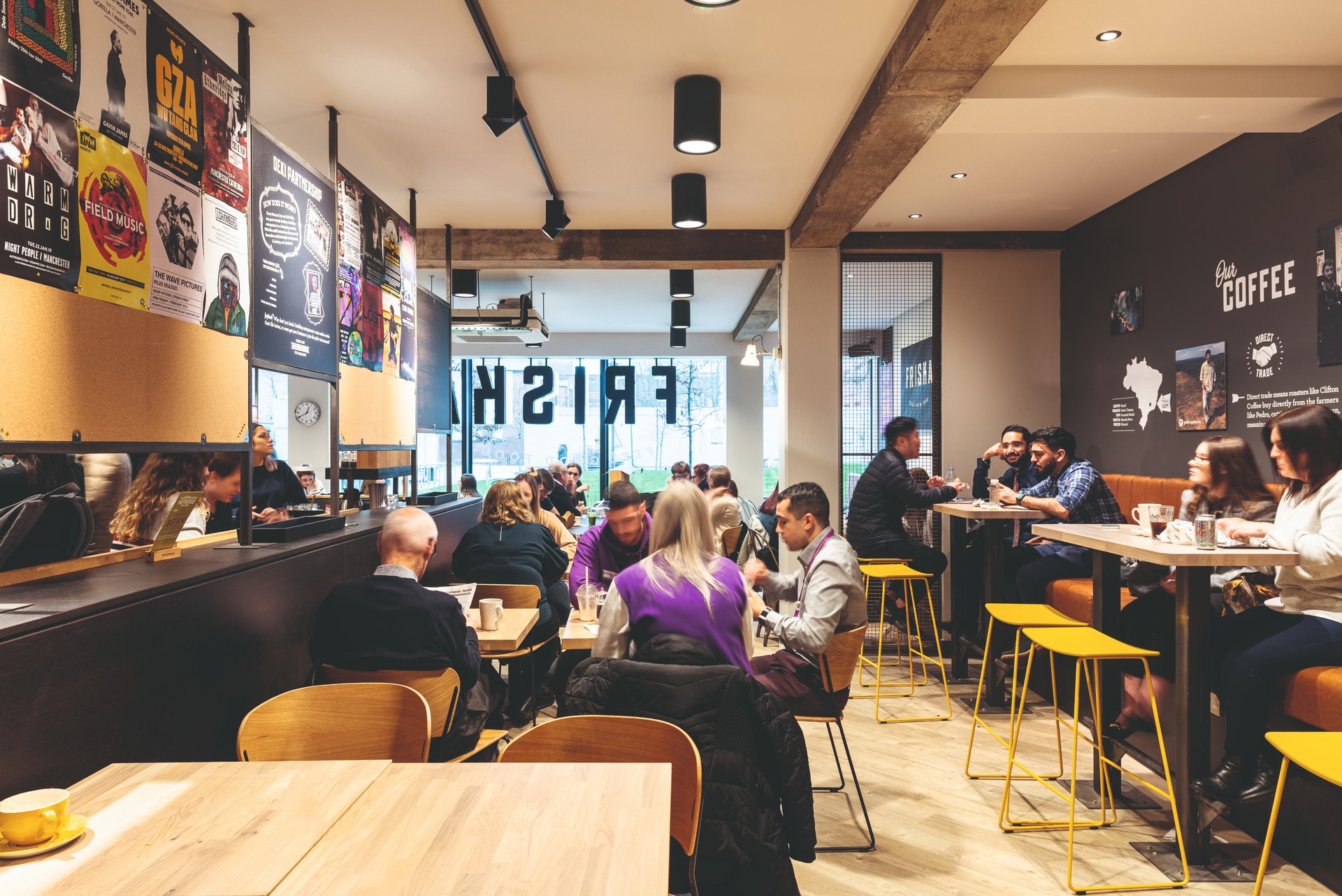
What to consider when finding a new location
— Friska
Friends Ed Brown and Griff Holland founded their feel-good food and coffee joint Friska in Bristol in 2009. Since then, they’ve launched eight more Bristol sites, along with three in Manchester and one at Luton Airport. Here Ed outlines the key aspects to the decision-making process.
01
Know your market.
‘A successful location is fundamentally where demand and supply match up. Remember, you are selling what the market in that location is demanding. For example, selling coffee at a busy commuter spot makes a lot of sense. Try to understand whether there are people likely to want what you are selling in a potential location.’
02
Consider all the costs.
‘It is key to understand all the costs associated with a potential property, and whether it’s affordable based on your business plan – remember that rent is just one of your costs. You’ll also need to add the business rates, service charges and building insurance to get the full picture of the cost of any site.’
03
Look out for corner sites.
‘Corner sites can be like gold dust. They can trade 25% better than non-corner sites, with much more natural light and significantly improved visibility. It’s well worth considering them because, despite a higher rent, you may well find it really helps your fledgling brand establish itself in an area more quickly.’
04
Think footfall.
‘Footfall is still a dominating driver. It's important that it's relevant (the right type of customer for the product or service you're selling) but high footfall ultimately means a larger potential market passing your front door. Things to consider include being located near pedestrian crossings, foot bridges or train station exits. Those can all give your site a significantly higher footfall than other locations on the same street.’
05
Pay attention to the details.
‘Remember people are generally a little bit lazy. So even if your prospective site is on a great street with a good demographic and low competition, if your pitch on that street is wrong, it could spell disaster. There are right and wrong sides of any street to be on, sides that get the sun, or are busier, or have bus stops obscuring your shop front. All these details matter, so pay attention.’
Glasgow
Ensuring that staff are treated the right way
— Sprigg
Glasgow's healthy-eating cafe Sprigg has earnt a positive rep for serving tasty seasonal salads and excellent coffee, while making sure its employees are well looked after.
Sprigg founder Tom McDermott’s management style doesn’t come from a place of angst. There are no dark stories of poor treatment in his own past – no falling out with restaurant owners or being made to work all hours for minimum wage. He simply thinks that treating staff well is the only way to operate.
Coming from a background in banking, some of hospitality’s norms were eye-opening. ‘There were a few things I witnessed that I was a little bit shocked by,’ he remembers, ‘like a colleague celebrating the fact she’d had a pay rise to £7.83 an hour because she’d made supervisor, which was like 33p an hour more. I just asked myself what the industry was doing if that was what this person thought she was worth.’
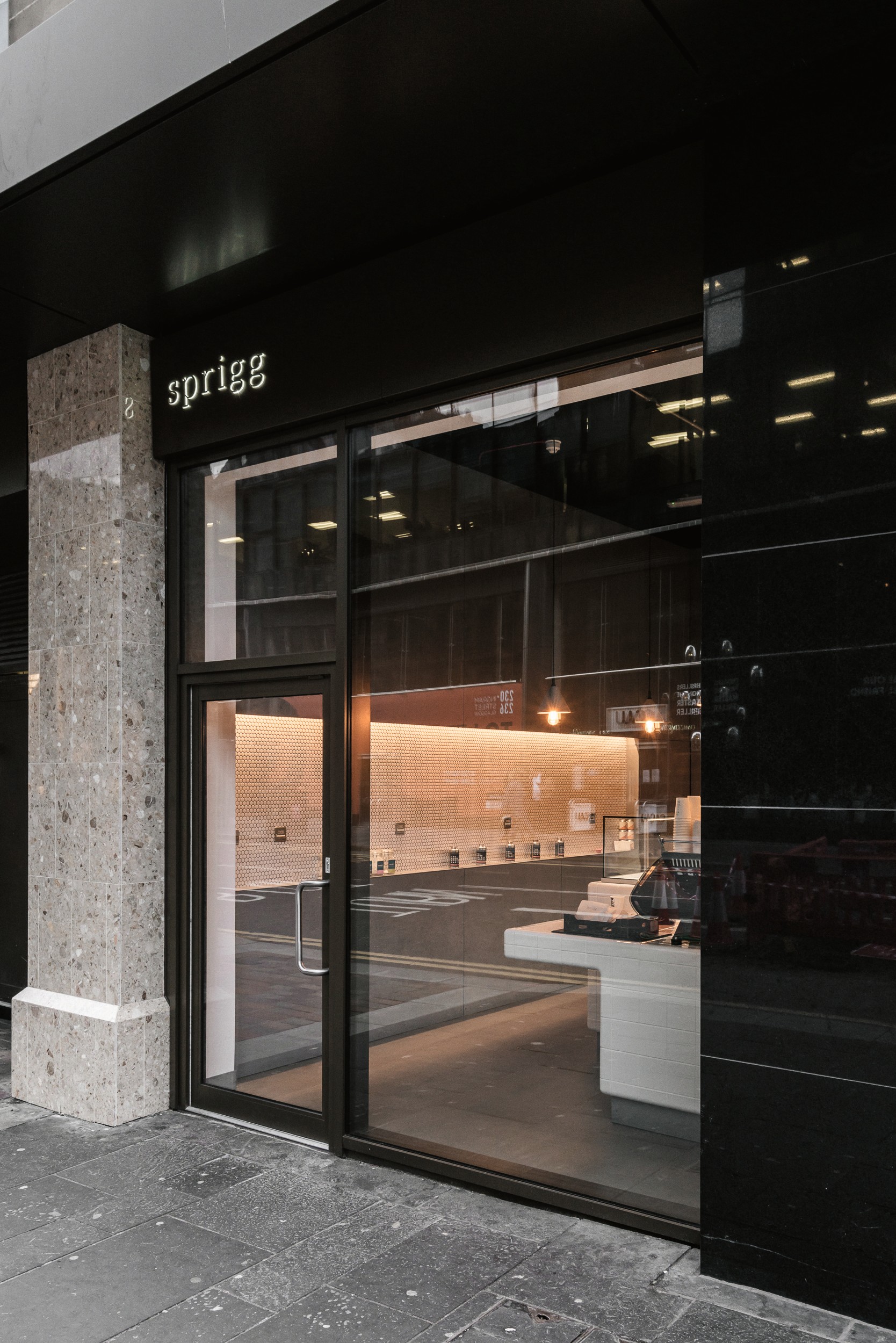
When Tom opened his bright cafe just off Glasgow's George Square on Ingram Street in August 2018, he was looking to do it differently. Garden-fresh ingredients and artisan barista-grade coffee don’t always go together, but Tom’s business plan married great coffee alongside breakfast pots, pastries, soups and build-your-own salad bowls from a streamlined, waste-cutting menu. It was, he says, about creating a ‘sustainable business that was built better and for the longer term’.
Taking care of his team has been a key part of that: Sprigg has paid its employees the real living wage since day one; offers shifts a month at a time so staff can plan their free time; and has a core group of full-time staff, supplemented by as few part-timers as possible, meaning that employees have less need to look for a second job. It all adds up to tangible benefits for the local community. Here Tom discusses what he thinks is key to keeping employees happy.
Hire well.
’If you know someone’s going to struggle to achieve what you need them to, it’s not fair on them or you. Set expectations early and make it clear at the interview what your standards are, what type of work they’ll be doing, and what the ethics of the business are. I have a huge amount of trust in my staff.’
Get the black-and-white stuff right.
‘The rate of pay, a flexible approach to work and shifts, healthy working hours, making sure staff get days off and breaks, paying them for their training time. They’re the basics to get right.’
Constantly develop.
‘Give people jobs to diversify their role; praise them when they exceed expectations. And be open to feedback about yourself from your team. You won’t just retain staff, you’ll retain customers.’
WHY ZETTLE?
Integration is easy
It’s so easy to get the right set up for your business with Zettle. Zettle is happy to advise its merchants on all kinds of business challenges and can provide impartial recommendations for integrations to solve specific problems and needs, including staff management, bookkeeping and product inventory.
London

Changing London's street-food industry
— Kerb
It’s only really since 2011 that street food has become a valid form of eating out in London – Kerb founder Petra Barran has had plenty to do with that.
Street food is such a big player in London’s dining scene, it’s easy to forget just how recent a phenomenon it is. That some of the city’s most talented street cooks have become organised, acknowledged and sought after is down, in no small part, to the vision of Petra Barran, who started out her small business journey from an ice-cream van. Her street-food incubator Kerb has allowed traders to get together around a unifying force, with markets and events across London. That now includes a brand-new permanent trading space in a former banana warehouse at 35 Earlham Street in Seven Dials.
Having started with her own Choc Star van back in 2005, Petra had been a regular across London's food markets, connecting with all kinds of ‘solid, earthy, wonderful’ traders, in what was a conversely tight-knit yet loose community. ‘There was no sense of a “scene”,’ Petra recounts, ‘it was a bit of falafel here, some paella there. Everyone was an individual doing their own thing.’
Then, following the financial crash, she noticed what was happening in the US – and particularly at the Street Vendor Project in New York. The precinct gave vendors a name, a story and a platform. ‘I thought: wow they’ve put them all together.’
In 2009, with the economic downturn resulting in restaurants closing and alternative trading spaces opening up, Petra sensed London was ready for something a little more informal. She got organised, pulling together a nomadic group of stall-holders and, in 2011, launched a food market at the freshly done-up Kings Cross precinct. ‘Getting that market was the first foray into serious conversations and contracts,’ she says. ‘I saw that this could become a business changing London's street-food industry — and that I could hang up my ice cream scoops, which I was ready to do.’ After that came Kerb, which Petra says was ‘founded around the principles of strength in numbers, greater visibility and creating opportunities through the benefits of that collectivity. It felt very needed.’
Today, Kerb counts 240 vendors among its talent pool – a commercialisation that Petra deems tricky to get right, but essential for survival. ‘It’s fascinating with Kerb coming into a 20-year lease in our own building,’ she elaborates. ‘How do we maintain what we’re all about when we’ve got the realities of rent to pay and running a building? The game was always to make this business last for a really long time, rather than just riding the trend of street food. It was always about the fact that cities need street food and street life to make them interesting.’
Five stalls to look out for at Kerb Seven Dials
1. Rice Guys - Chinese comfort food
2. Nanban - Japanese soul food from Masterchef winner Tim Anderson
3. Club Mexicana - vegan Mexi-Cali street food
4. Strozzapreti - a fresh pasta joint from the team behind Franco Manca
5. Yum Bun - Taiwanese steamed buns
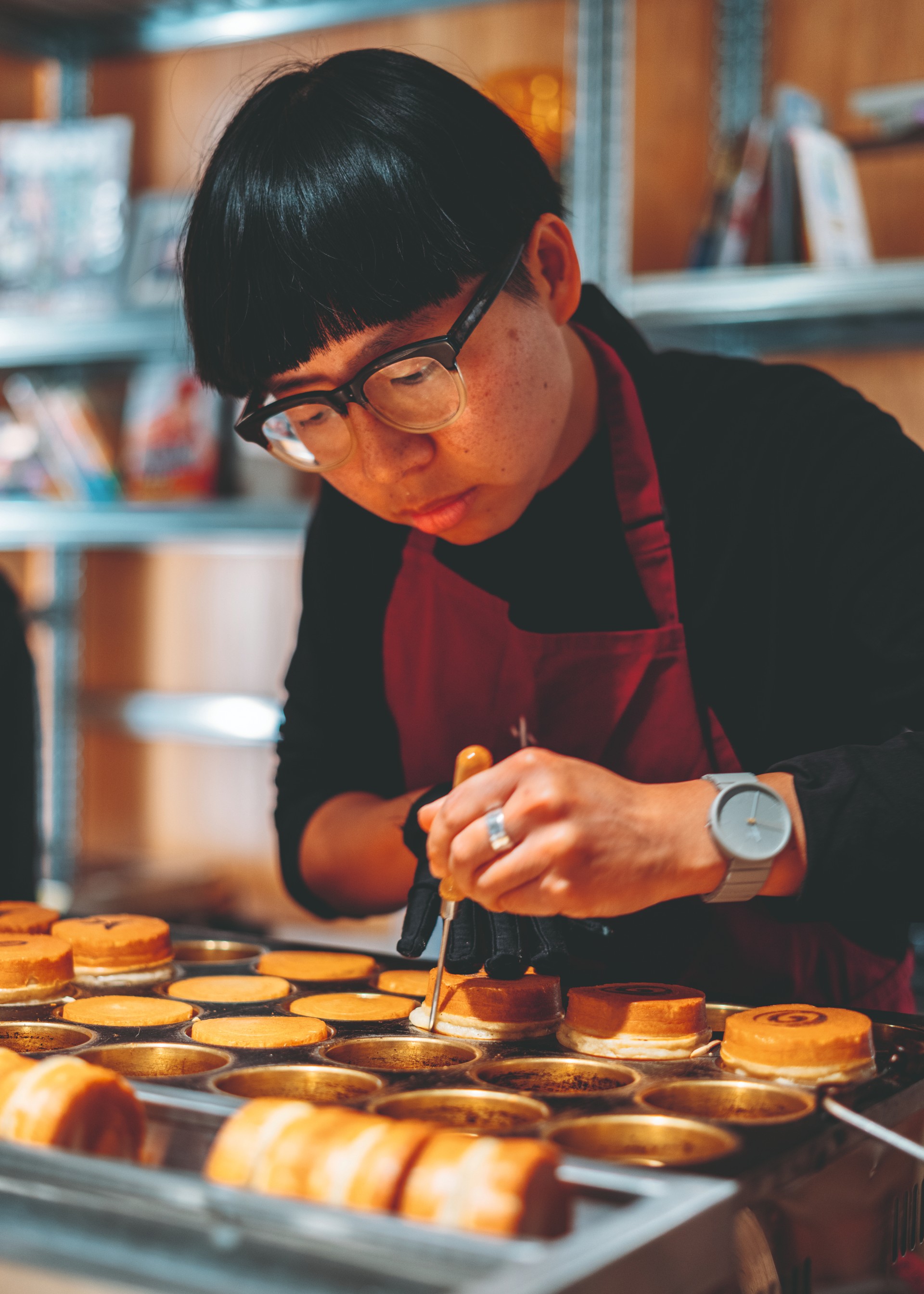
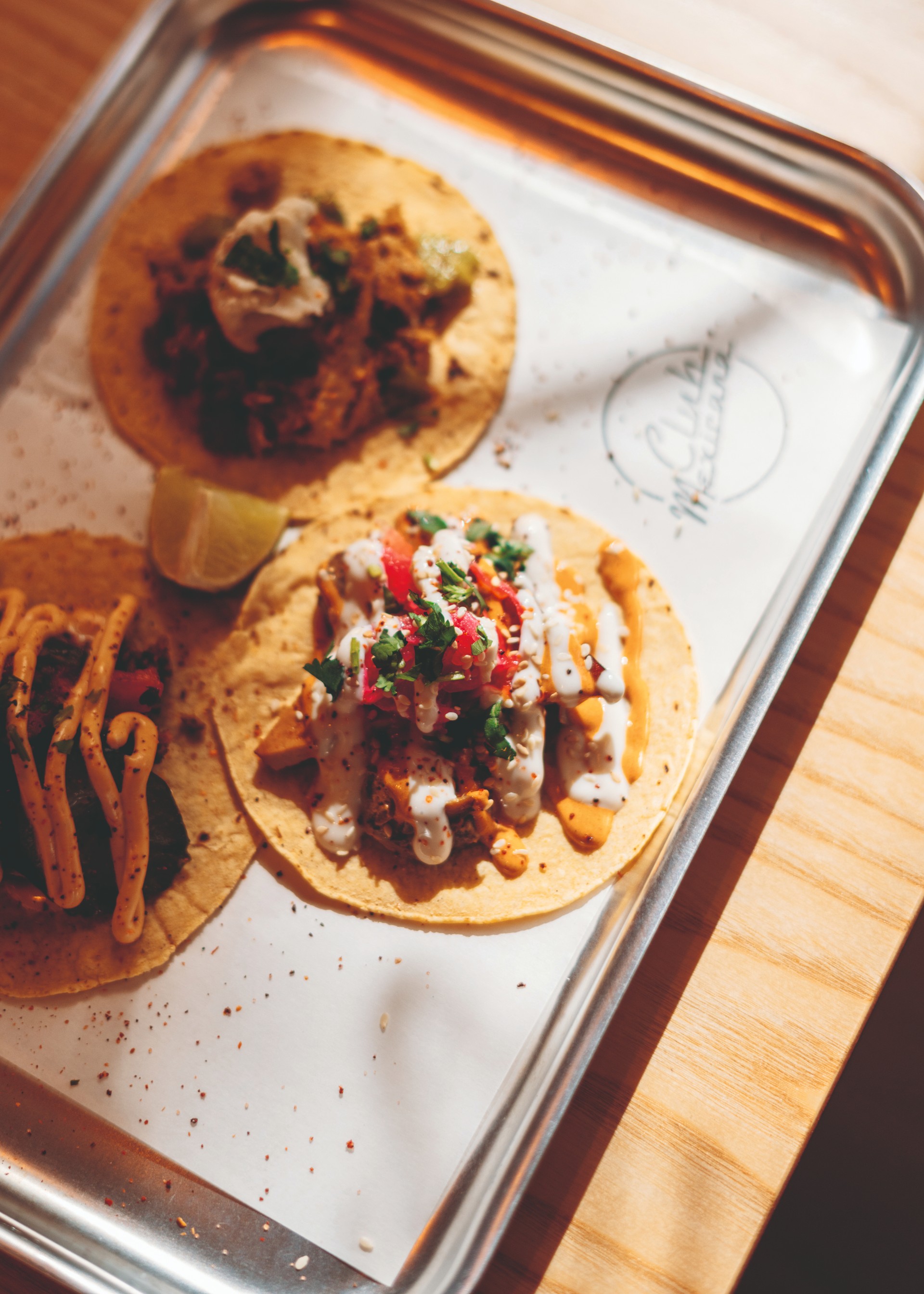
WHY ZETTLE?
Clear and simple pricing
Zettle employs a straightforward pricing structure, with no hidden costs or confusing terms and conditions. Which means you can concentrate on the things that really matter – your product and your customers.
